Final Report
Liu's Final Report
Introduction
My name is Kaewkul Tantipisitkul. My friends call me “Liu”, which is my nickname. I was born with hearing loss in both ears. I grew up in the world of the hearing and communicated with my hearing family and friends by lip-reading and listening to the best of my abilities. This meant I never gave much thought about the world around me until I had a chance to join a deaf community. This community showed me that our society needs to improve, because there is inequality that should not be there. Time flew so fast. My world gradually became wider and the world around me showed me a clear direction, urging me to do more to make life easier for people. My learning did not stop. I need more knowledge to make things happen. This was why I decided to learn three things from Japan, to get ideas that can be applied to my country. They are:
- Negotiation skills
- Accessibility to information
- Way of thinking and behavior pattern of Japanese people
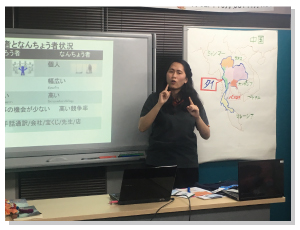
Learning Japanese language and Japanese sign language
The three months of learning Japanese and Japanese sign language was so wonderful and very useful for my day-to-day living. Japanese and Japanese sign language are essential for learning and accessing knowledge in Japan. I was so happy and excited when I looked around me and realized I could read the kanji I saw or understood new words I saw when I travelled. Without learning Japanese sign language and Japanese, I would not have been able to access nor gain much knowledge. I am so thankful to my Japanese sign language teachers and Japanese teachers. I am very grateful.
Home-stay
I had a wonderful time staying with the homes of two Japanese families in Hokkaido. They were so nice and kind. We talked a lot in sign language. Through the stay, I learned that Japanese sign language varied depending on region. So, for the first time, I learned Hokkaido’s sign language, which was different from what I had learnt in the previous three months. It was very interesting and funny to learn many new signs. I had a lot of experience in Hokkaido. Especially memorable was my first visit to an onsen (hot spring), where I saw snow. I would like to thank my home-stay families. They made my day and made my New Year a warm experience that will stay in my mind forever.
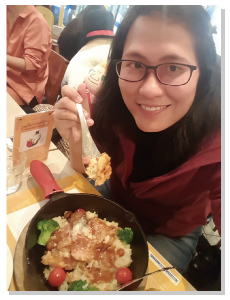
Ski training
I learned skiing for the first time. In the beginning, it was painful. Later, the teachers told me to adjust my postures while skiing. I was delighted that with all the fundamental knowledge, my skills gradually developed, enabling me to ski smoothly. Knowledge is important for everything. Knowledge is essential in acquiring the skills I trained for. Getting good basic skills from good teachers, is also important for skill development.
Individual training
Negotiations:
One of the goals of the training was to learn about negotiating skills with the government. I was given an opportunity to interview deaf leaders and deaf people with academic knowledge, who had hands-on experience of negotiating with the government. They shared unshaken belief, bravery, information and the power to involve many people.
Accessibility to information:
- In Japan, some TV programs offer real-time sign language interpretations and captions. They also have sign language news, which is very interesting. With the sign language, I managed to understand news and learn Japanese.
- In Japan, sign language interpreters are provided for a wide range of things. For instance, they can be sent to personal events such as weddings and university occasions.
Sign language interpreter training and examinations can be introduced to my home country. I grew to have a better understanding of how sign language interpreters developed in Japan. Moreover,
- Alert services that can be seen or felt will make life easy. For example, if a baby is crying in the house, the guardian can be alerted it is emergency, by a vibrating device. These services will be great for deaf and the hard of hearing. There are no such services in Thailand. I would like to introduce them to Thailand and show people how good they are.
- The class I attended at Tsukuba University of Technology was very impressive. For the first time in my life I had a chance to observe and join the class taught by a deaf professor, who only used sign language. I saw how good it was, to be appropriately taught through visual communication (sign language).
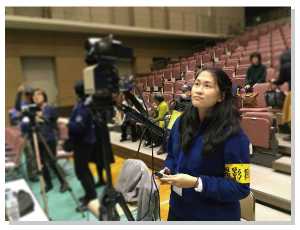
Life:
- In Japan, there is an appropriate environment of support for senior citizens and job support for deaf and the hard of hearing. I had a chance to interact with seniors and workers. I will share this experience with my friends and make it the next step to think about how the knowledge could be applied to my country.
- Japan has day care service for children which is much needed and helps working parents. It is good because children can learn sign language when parents are at work.
- I was impressed by Meisei Gakuen, a bilingual school whose education was based on sign language. The Children were talkative, active and boldly expressed their opinions. I realized that they would be able to express their emotion and reason well in future.
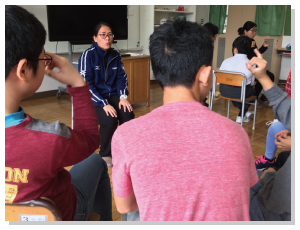
Returning to Thailand
When I joined the world of the deaf and hard of hearing, it determined the direction I would like to take. From the beginning it was clear that it was my way. I vowed to myself never to forget my first resolution. Japan gave me a lot experiences which enabled me to learn and compare the two countries, Japan and Thailand. The problems and solutions between Japan and Thailand may be different. But, I will adjust and apply the knowledge to my country. I would like to solve current problems and make a barrier-free society with my experience, training and learnings. They gave me many ideas. Last but not least, I cannot drive things forward without team work. This is why I will ensure the following steps.
First, I will share my experiences and ideas with friends and my organization to plan future project.
Second, I will implement the project to support the life of the deaf and hard of hearing. I would like to establish information and communication access center for the deaf and hard of hearing to support their daily life.
Third, I would like to advocate sign language and international sign language to support deaf people.
It is impossible to describe how invaluable my experiences from Japan have become to me. I got to know myself more and I established good relationships, with good people. We will support one another and make the world a better place, with the aptitude of each person.
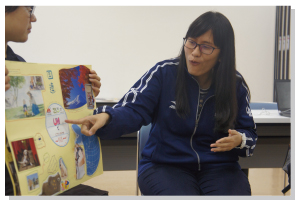
Acknowledgments
From the bottom of my heart, I would like to thank Duskin AINOWA Foundation, the Duskin family, the Japanese Society for Rehabilitation of Persons with Disabilities for all the support and encouragement they gave me, and for helping me develop knowledge, including knowledge about Japanese culture. Last but not least, I would like to express my deep gratitude to all my teachers, friends and Japanese people. All of you gave me a warm welcome and filled my heart with happiness during my training in Japan.




